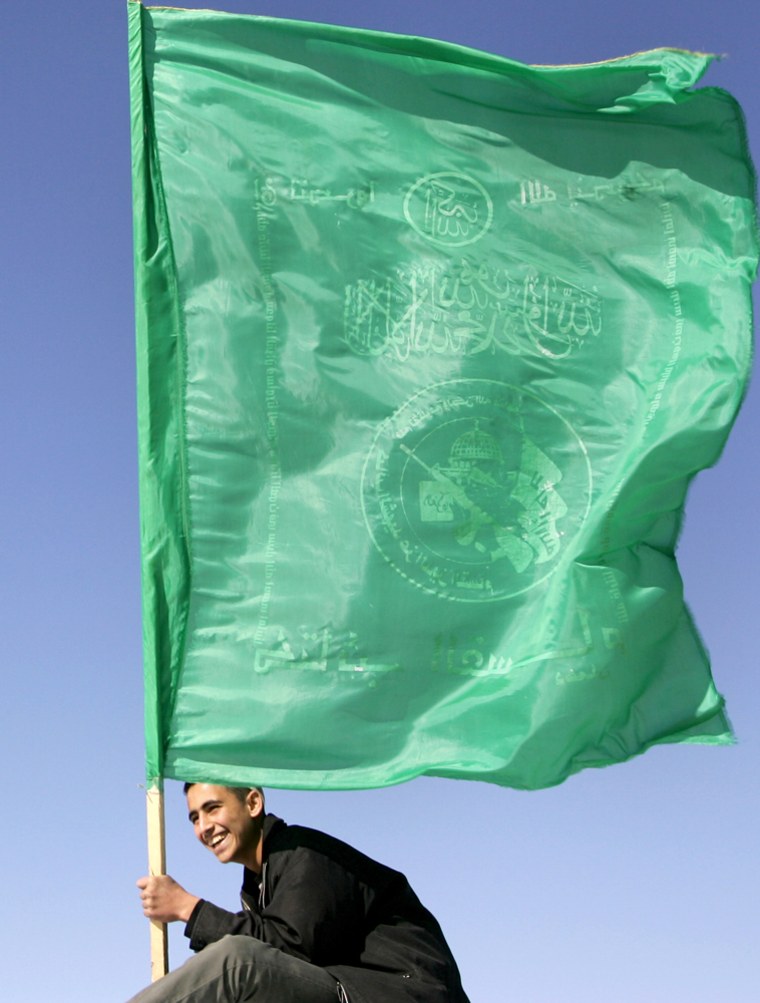An apparent win by the Hamas party in the Palestinian parliamentary election could bury chances for peace. Below are answers to some questions about the election results and what they could mean for the future.
Why did Hamas do so well?
A lot of support came from Palestinians keen to end the domination of the Fatah movement, which led since late leader Yasser Arafat agreed interim peace deals with Israel in the early 1990s. Palestinian leader Mahmoud Abbas’s Fatah was long seen as corrupt, out of touch and divided.
Hamas, officially dedicated to destroying Israel, was at the forefront of a Palestinian uprising since 2000.
Will Hamas form a government?
It is up to Abbas to pick a prime minister, but he needs the support of the biggest party in parliament, effectively leaving the shape of the next government in the hands of Hamas.
With a parliamentary majority, Hamas could theoretically choose to govern alone, but would prefer a coalition. A prime minister would not necessarily have to come from Hamas ranks.
Fatah officials say they will not participate in any Hamas coalition. That could prolong discussions over a new government and leave Hamas to court smaller parties and independents.
What happens to Palestinian leader Abbas?
Abbas is not directly affected because he was elected in 2005, but he said recently that he could resign if he is unable to pursue his agenda for peacemaking with Israel.
Will Hamas keep fighting?
Rhetoric about resisting Israel is certain to continue, but Hamas has largely followed a truce for nearly a year and has not carried out a suicide bombing since August 2004.
It would be difficult for it to allow its armed wing, the Qassam Brigades, to carry out such attacks openly while also playing a government role and needing to assure donor funding.
But Hamas will now be able to use its position to reject any suggestion that it should disarm its militants, a process that is meant to start under a U.S.-backed peace “road map.”
What would Hamas priorities be?
The priorities for a Hamas-dominated government are likely to be internal issues -- such as tackling insecurity, poverty and health care that directly affect the lives of Palestinians. It would be expected to promote conservative Islamic values without necessarily imposing them by force.
What happens to peacemaking?
There is no foreseeable prospect for reviving talks on Palestinian statehood that collapsed in 2000.
Hamas has said it will not recognize Israel, though it has suggested that talks would not “be taboo” if the Israelis gave up all of the West Bank, Gaza Strip and East Jerusalem -- which the Jewish state will not. It has floated the idea of contacts through a third party.
Israel has said it would only talk to Hamas if the group put down its weapons and dropped the provision in its charter calling for the destruction of the Jewish state.
While the Hamas position might change over the long term, there is no immediate prospect of a shift.
What will Israel do?
In the absence of talks, Israel is more likely to pursue unilateral moves to set a final border with the West Bank following its withdrawal from the Gaza Strip last year.
Interim Prime Minister Ehud Olmert suggested as much this week in his first policy speech since assuming the powers of Ariel Sharon, who suffered a stroke on Jan. 4. Olmert is widely expected to win a March 28 general election.
A likely route for a border would be the barrier Israel is building in the West Bank in the name of security. Palestinians call the barrier a land grab and say it would deny them the viable state that they seek.
What will the West do?
Washington rules out any talks until Hamas changes. The European Union has said it would only work with a government that uses peaceful means. Western aid is vital to running the Palestinian Authority and both the United States and Europe have suggested it could be cut if Hamas won.
